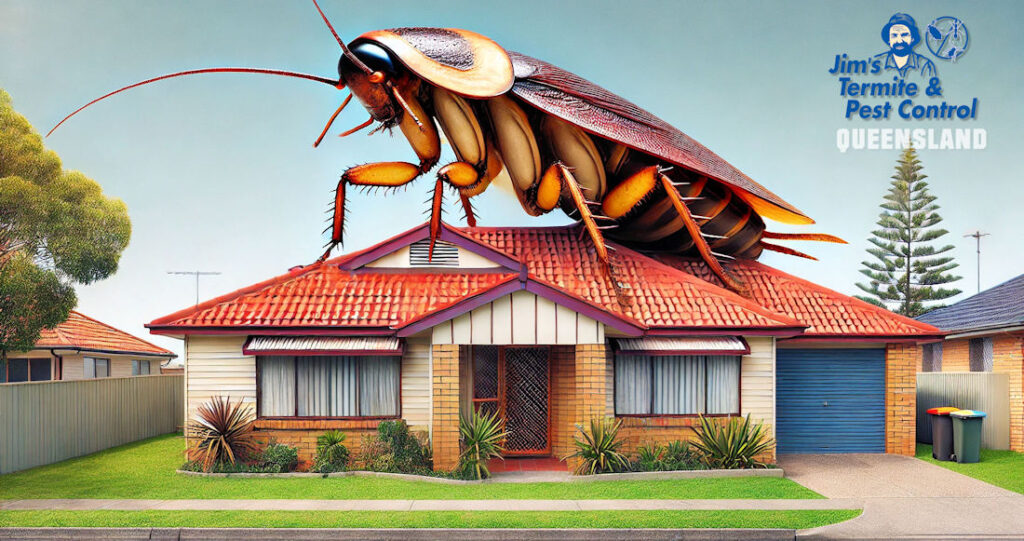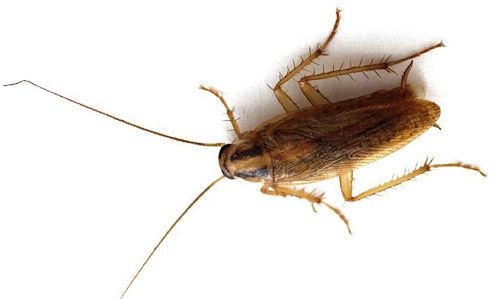The German cockroach, scientifically known as Blattella germanica, is a small, light brown cockroach. This insect is highly adaptable and is commonly found in human dwellings. These cockroaches are about 1.1 to 1.6 cm long and have two dark parallel stripes on their backs. They are known for their rapid reproduction and resilience.
If you are around the Brisbane, Gold Coast, Sunshine Coast or Ipswich areas of Queensland, and think you have a cockroach problem, please call your local pest exterminator at Jim’s on 131 546 today!
Where Does the German Cockroach It Get Its Name?
The German cockroach’s name might suggest a German origin, but its true origins are unclear. Some believe it came from Africa, while others think it originated in Asia.
The name “German” may have been chosen due to a translation error or historical trade routes. Regardless of its origins, this cockroach has become one of the most widespread pests globally.
How Common Are They in Queensland?
In Queensland, German cockroaches are incredibly common. The warm, humid climate provides an ideal environment for these pests to thrive. They are often found in urban areas, infesting homes, restaurants, and other buildings where food and water are readily available.
Queensland’s climate, combined with the cockroach’s adaptability, makes infestations a frequent problem.
Problems Caused by German Cockroaches
Health Issues
German cockroaches are notorious for spreading diseases. They carry bacteria like Salmonella, which can cause food poisoning. Their droppings and shed skins can also trigger allergies and asthma in sensitive individuals.
The presence of these cockroaches in homes and businesses poses significant health risks.
Contamination
These cockroaches contaminate food and surfaces with their faeces and saliva. This contamination can lead to significant hygiene issues, especially in places where food is prepared. The contamination can result in spoiled food and the spread of diseases, impacting both health and safety.
Unpleasant Odour
German cockroaches produce a musty, unpleasant odour. This odour can permeate food, furnishings, and other items in infested areas, making them highly undesirable. The smell is due to the pheromones they release, which are used to communicate and attract other cockroaches.

How to Get Rid of German Cockroaches
Cleaning and Sanitation
Maintaining cleanliness is crucial. Regularly clean kitchen surfaces, floors, and other areas where food is prepared. Store food in sealed containers and dispose of garbage frequently.
Cleaning helps remove food sources that attract cockroaches and reduces the chances of infestation.
Reduce Moisture
Cockroaches need water to survive. Fix any leaky pipes and reduce humidity levels in your home. Using a dehumidifier can help keep these pests at bay. Reducing moisture levels makes the environment less hospitable for cockroaches.
Use Baits and Traps
Cockroach baits and traps are effective tools. Place them in areas where cockroaches are commonly seen. Baits contain slow-acting insecticides that the cockroaches carry back to their nests, poisoning other members. Traps can help monitor the infestation level and reduce the population.
Insecticides
Insecticide sprays and dusts can be used to target cockroach hiding spots. Apply these products to cracks, crevices, and other areas where cockroaches are likely to hide. Follow the manufacturer’s instructions for safe use. Insecticides can provide a quick reduction in cockroach numbers when used correctly.
What Exterminators Do
Inspection
Professional exterminators start with a thorough inspection of the infested area. They identify the extent of the infestation and locate hiding spots and entry points. A detailed inspection is crucial for an effective treatment plan.
Cockroach Treatment Plan
Exterminators develop a customised treatment plan. This plan often includes a combination of baits, traps, insecticides, and other methods to effectively eliminate the cockroach population. The plan is tailored to the specific infestation and environment.
Application of Insecticides
Professionals apply insecticides in targeted areas. They use specialised equipment to reach deep into cracks and crevices where cockroaches hide. This ensures a more comprehensive treatment. The professional application ensures safety and effectiveness.
Follow-Up Visits
Exterminators often schedule follow-up visits to monitor the infestation. They may apply additional treatments if necessary and provide recommendations for preventing future infestations. Follow-up visits help ensure that the cockroach problem is fully resolved.
Preventing Future Cockroach Infestations
Regular Cleaning
Maintain a high level of cleanliness in your home. Regularly clean floors, countertops, and other surfaces to remove crumbs and spills that can attract cockroaches. Consistent cleaning helps prevent infestations.
Seal Entry Points
Seal cracks and crevices in walls, floors, and around windows and doors. This prevents cockroaches from entering your home. Sealing entry points is a key preventive measure.
Proper Food Storage
Store food in airtight containers. Keep pet food sealed and do not leave it out overnight. Proper food storage reduces the availability of food sources for cockroaches.
Regular Inspections
Conduct regular inspections of your home, especially in areas where cockroaches are likely to hide. Early detection can help prevent a small problem from becoming a major infestation. Regular inspections can catch infestations early.

German Cockroach FAQs
How long do German cockroaches live? German cockroaches live for about 100 to 200 days. Their lifespan can vary based on factors like temperature, humidity, and food availability. Can German cockroaches fly? While German cockroaches have wings, they are not strong fliers. They may glide short distances but primarily rely on their legs for movement. What attracts German cockroaches to my home? German cockroaches are attracted to food, water, and shelter. Kitchens and bathrooms are common hotspots due to the availability of these resources. Are German cockroaches harmful to pets? Yes, German cockroaches can be harmful to pets. They can contaminate pet food and water, and their presence can cause stress and allergies in animals. How do I know if I have a German cockroach infestation? Signs of an infestation include seeing live cockroaches, finding droppings (small black specks), and detecting a musty odour. Shed skins and egg cases are also indicators. How quickly do German cockroaches reproduce? German cockroaches reproduce rapidly. A female can produce up to 40 eggs at a time and may have multiple egg cases in her lifetime, leading to a large population quickly. What is the best way to prevent German cockroach infestations? The best way to prevent infestations is through regular cleaning, proper food storage, sealing entry points, and reducing moisture levels in your home. Can I get rid of German cockroaches on my own? While DIY methods can reduce cockroach numbers, professional extermination is often needed for severe infestations. Professionals provide thorough treatments and follow-up visits to ensure complete eradication.
By following these guidelines and understanding more about German cockroaches, you can effectively manage and prevent infestations in your home. For professional pest control help with any infestation, please call your local experts at Jim’s on 131 546 ASAP.


